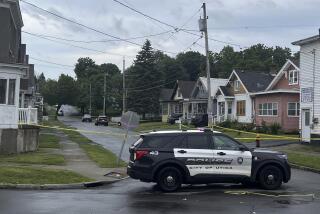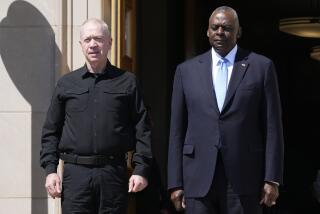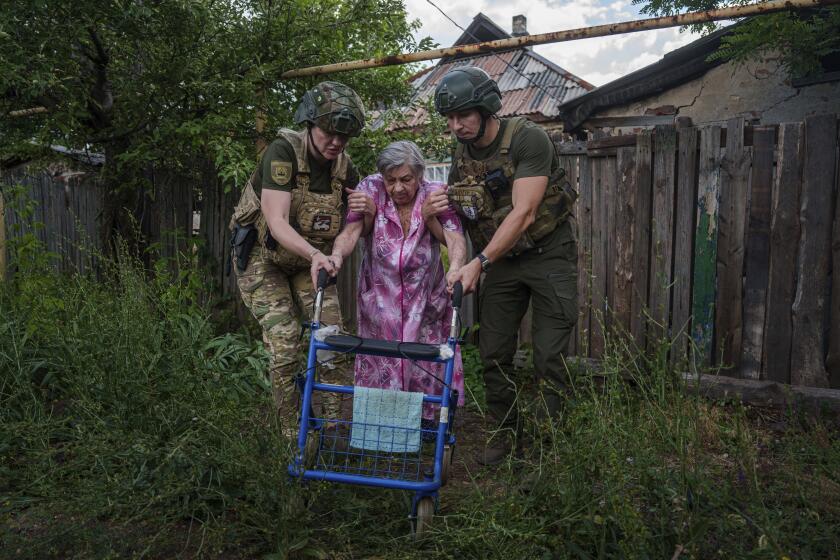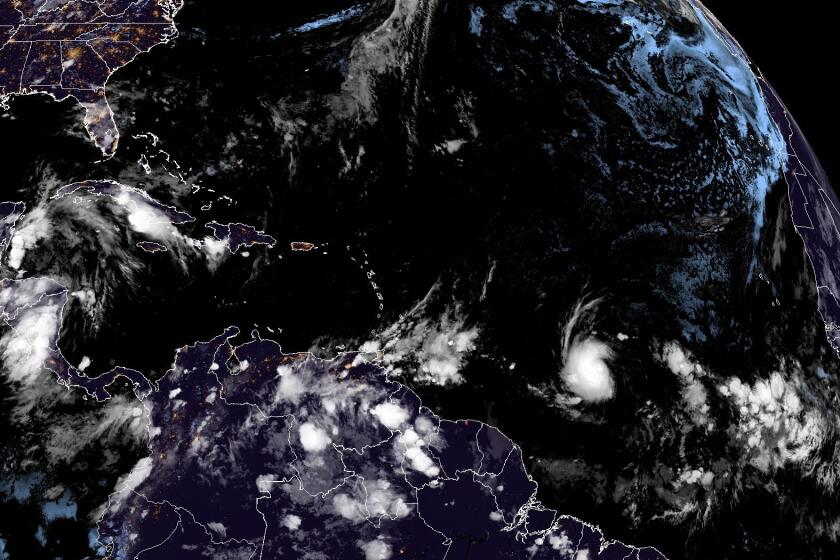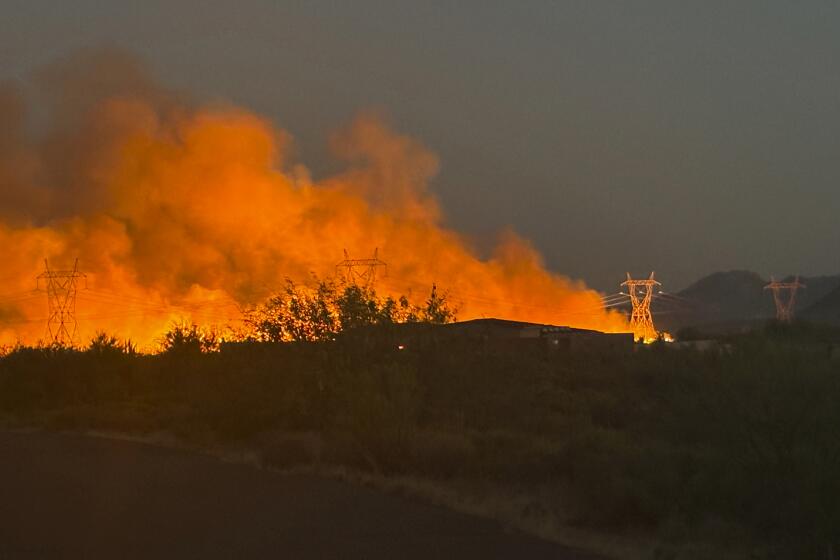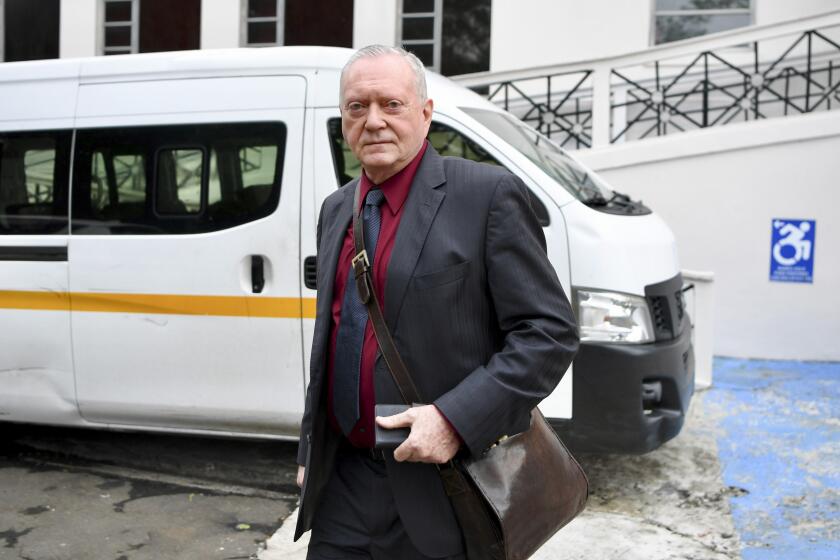S. Africa City Cracks Down on Christmas : Caroling Banned as ‘Emotional’; Church Services Restricted
Christmas is subversive, the police here seem to have decided, and they are using their wide-ranging powers under South Africa’s state of emergency to curtail the celebration this year.
Describing Christmas carols as “too emotional” to be sung at a time of such widespread unrest, the police banned caroling in the city’s black and Colored (mixed-race) ghetto townships. Churches wanting to hold their traditional candlelight services were told that they needed special permits--the kind required for political rallies.
An ecumenical Advent service, planned for the Colored suburb of Athlone, was banned by police. They said it was bound to turn into an anti-government rally protesting South Africa’s apartheid system of racial separation and the five-month-old state of emergency. Cape Town’s chief magistrate upheld the police.
Candlelight March Disbanded
A candlelight procession along Cape Town’s sea front by about 600 people, mostly whites, combining favorite carols and religious hymns with anti-apartheid songs and chants, was broken up by police using whips after they had declared it an “illegal gathering” and ordered the marchers to disperse within five minutes.
And weekly Wednesday night prayer vigils, not only marking the approach to Christmas but also protesting the state of emergency, have been denounced as often leading to violence and “not at all innocent” by Brig. C. A. (Blackie) Swart, Cape Town’s police commissioner. Swart ordered his men to break up the vigils, arrest the participants and extinguish their candles.
The candlelight vigils, Swart said, were “deliberately aimed at stirring up people’s emotions, which leads them to violent acts.”
Whips, Tear Gas
Police, wielding long whips, firing tear-gas grenades and wrenching candles from the hands of participants, have broken up vigils all around Cape Town during the last month.
“These candles have become revolutionary symbols, you know, and just lighting them seems to stir these people’s emotions and make them violent,” said a police spokesman, who under departmental policy may not be quoted by name. “Besides, sometimes they are used for arson, these Christmas candles.”
Now, in protest against the police crackdown on the vigils, some neighborhoods go completely dark for one or two hours each Wednesday evening. Where the candles glowing in the windows of each home gave a feeling of faith and hope in adversity, the total blackout gives a sense of deepening anger and despair.
Although Cape Town churches have called upon Christians here to observe a low-key “Christmas of concern,” dropping the usual celebrations because of the unrest, there has been only a limited consumer boycott here and none of the turmoil that has come with the “black Christmas” campaign in the Witwatersrand region around Johannesburg and Pretoria.
There, black militants have called upon the community not only to boycott white merchants, but to cancel all planned weddings, parties and other celebrations. Those who shop in white-owned stores or hold parties in defiance of the “black Christmas” call are liable to be beaten and even killed by youthful black vigilantes enforcing the boycott.
Pricking the Conscience
At least 14 persons have died this month in the Johannesburg area as a result of the “black Christmas” campaign, according to police reports.
In Cape Town, the protests have largely been vigils, prayer meetings and other religious services. These are all measures intended to prick the conscience of a nation that is more than 80% Christian and church-going and to claim the moral high ground for the anti-apartheid movement.
The harsh actions of the police against these peaceful protests, regarded as both religious and political, have brought them into sharp conflict with Cape Town’s church leaders, who accuse the minority white regime of denying its opponents freedom of religious worship as guaranteed by the country’s constitution.
“The fact that people actually have to ask permission to hold a prayer service is an indication of the kind of police state this country is becoming,” said Tiaan van der Merwe, a local member of Parliament from the liberal, white opposition Progressive Federal Party.
“There is very little left of basic human rights when magistrates and police officers can take whatever decisions they like without having to offer any sort of justification,” he added.
The committee that had tried to organize the Advent carols at Athlone--made up of Anglican, Catholic, Dutch Reformed, Lutheran and Presbyterian clergymen--said the bans have “far-reaching implications in terms of religious freedom and the right of Christians to practice their religion.”
The committee added: “We were told by the magistrate that the service was political and that therefore he could not allow it. He did not accept our explanation that the church in times like these had no option but to reflect prevailing sociopolitical conditions.”
One parish, the Anglican Church of the Good Shepherd, canceled its annual candlelight caroling service in Cape Town’s Kirstenbosch Gardens rather than seek a police permit. Father Ronald Taylor, the rector, described the permit as “a totally unacceptable state control on religious expression.”
The decision, Cape Town’s Argus newspaper said in an editorial entitled “Silent Night,” means that “in the prevailing circumstances the church does not feel it has freedom of worship--a freedom enshrined in the constitution--and, sadly, its view appears to be supported by the prohibition on (the Athlone) carols-by-candlelight service.”
“The authorities should demonstrate clearly and urgently that in exercising their emergency powers they are not being so repressive as to bring into doubt one of the essential freedoms in a Christian society,” the paper said.
But the Rev. Allan Boesak, president of the World Alliance of Reformed Churches and a founder of the United Democratic Front coalition of anti-apartheid groups here, said the government has “decided to wage war” on the Christian church.
Complaining that police fired tear-gas grenades at members of his congregation as they were leaving a service in suburban Bellville, Boesak said, “Not even in Communist Russia do people get tear-gassed for going to church.”
“Why is it a crime to light a candle?” he asked. “We teach our children that it symbolizes hope and love. This has been a Christian tradition since the beginning of the church.”
His own family’s observance of Christmas will be muted, Boesak said, in keeping with the call by the Cape Town area’s council of churches for a “Christmas of concern.” His Christmas tree, as a result, is decorated with a single candle, and inexpensive presents for his children have been wrapped with black ribbons.
Boesak, speaking at a candlelight service, said the church will not be silenced or intimidated into acquiescence.
“The church is persecuted because it stands up for truth and justice and for the weak,” he said. “As long as this church exists in this place, we shall preach the word of God as truthfully as we can.”
Cartoons Criticize Police
Cartoonists at the Argus and the Cape Times, the city’s other newspaper, have reflected the broad community view that the police have gone too far in their efforts to curb the civil unrest.
A Cape Times cartoon last week, for example, showed five Roman soldiers, armed with swords and spears, standing under the Christmas star and telling the three kings who had come in search of the newborn Jesus: “This is an illegal gathering under the riotous assembly provision of the Internal Security Act. I’m giving you three minutes to disperse.”
Another showed a little old lady in court facing a stern magistrate and an angry prosecutor who was accusing her of “willfully and maliciously parading along the beachfront bearing a lighted candle and singing, ‘Hark the Herald Angels Sing.’ ”
Little of this criticism bothers Swart, who relishes his reputation as South Africa’s “toughest cop.” He has cracked down hard on the government’s opponents, jailing hundreds under emergency regulations that permit indefinite detention in solitary confinement without charge.
Brought here three months ago to halt the increasingly violent protests against the government, Swart reportedly told local members of Parliament and of the Cape of Good Hope provincial council that, “come Judgment Day, we will see who is in Heaven and who is in the other place, me or these preachers.”
“We know some of these ministers are really revolutionaries, not reverends,” Swart was quoted as saying by a representative at a recent meeting with him. “These so-called caroling services are really being organized by radicals.
“We know that, and no amount of pious talk about religious freedom is going to make me allow these vigils and caroling to continue. No way. No way at all. If they want to sing, let them sing in church. If they want to light candles, let them put them on the altar. We are not fighting God; we are fighting Marx.”
More to Read
Start your day right
Sign up for Essential California for news, features and recommendations from the L.A. Times and beyond in your inbox six days a week.
You may occasionally receive promotional content from the Los Angeles Times.

